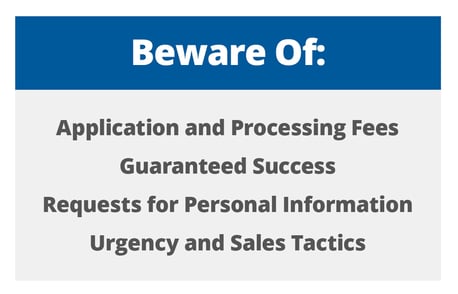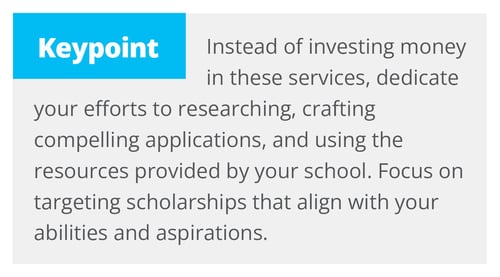Table of Contents
Between tuition, textbooks, and other student expenses, college life can add up. Many students will be seeking out scholarships, as they are a great way to fund your education. However, it's essential to be careful while browsing through the numerous options available. It's important to know what to look for, and what to do if the scholarship you've stumbled across is a trustworthy option.
With this guide on your side, our hope is that you can differentiate between genuine opportunities for scholarship money and attempts at fraud. That way, you can confidently look for financial assistance to support your educational dreams and rest assured you're avoiding scams. Persistence and diligence in your search for scholarships will ultimately pay off in funding your education without falling victim to these attacks.
Spotting Scholarship and Financial Aid Scams
Unfortunately, with the cost of education going up, scholarship scams related to financial aid are becoming more common. These malicious scams take advantage of students' worries about saving enough for college. Staying aware of the warning signs is the best way to keep yourself safe from these schemes. Then, you can focus on applying to real scholarship programs.
Common Signs of Fraudulent Scholarships
In your scholarship search, it's crucial to be aware of common signs that can spell out fraud. Scholarships that promise guaranteed success or demand an upfront fee should raise red flags, as reputable providers don't require application or processing fees. Use caution when you're asked for any sensitive personal details early on. Also, scholarships that push you to make hurried decisions or use high-pressure sales tactics should be cause for concern. 
The truth is, if something appears overly advantageous, it likely isn't real. Genuine scholarship applications typically request only basic personal information, academic records, and essays. It's essential to remain vigilant and rely on your instincts when weighing potential opportunities. In addition to these warning signs, conducting thorough research on the scholarship provider and verifying their credentials can help protect you from falling victim to scams.
How Scammers Target Students
Now, let’s look at how these scammers go after students. Scammers often target students' hopes for higher education. They take advantage of the stress from searching and applying for scholarships.
One way they do this is by sending fake emails that look like they're from real organizations. This can include well-known scholarship providers, or even your high school. These emails may have links to fake websites, made to steal your personal information or to infect your device with harmful software. Always be careful when you click on links in emails you didn’t ask for. It's always better to check if the organization or scholarship is real. You can do this by looking up their official website or calling them with verified contact details.
Verifying Scholarship Legitimacy
Before you spend your time and effort on a scholarship application, take time to do your due diligence. There are a few easy steps you can follow to make sure a scholarship isn't a scam. As a result, you can feel safe applying for scholarships that might actually open new doors for you.
Steps to Confirm a Scholarship's Authenticity
To ensure that you are dealing with a legitimate scholarship provider, follow these steps:
- Research the Organization: Conduct thorough research on who it is that's offering the scholarship. Look for established organizations with a transparent online presence, including a professional website and verifiable contact information.
- Evaluate Website Content: Carefully examine the scholarship provider's website for any red flags, like grammatical errors, unprofessional design, or unrealistic promises. Pay close attention to the scholarship's terms and conditions.
- Verify Contact Information: Take extra measures to confirm the scholarship provider's contact information by calling their provided phone number and confirming their physical address. Legitimate organizations are easy to contact and transparent about their operations.
These actions might seem simple, but they can save you a lot of time and money as you look for extra financial support. We encourage you to follow these steps every time you consider applying for a scholarship.
Why It's Important to Verify Before Applying
If you give your financial information or personal details to a fake scholarship provider, it can lead to serious problems. Scammers often take this information to steal your identity or commit financial fraud. Unfortunately, this can mean losing a lot of money and hurting your credit score – which can negatively impact your financial future. That said, it's worth your while to take extra time and remain cautious throughout the application process.
Protecting Yourself from Scholarship Scams
Protecting yourself from scams requires you to stay vigilant. That way, you can lower your chances of being fooled into giving up money or personal information. Remember, real scholarships are given based on merit or need.
Safeguarding Personal Information During Applications
Safeguarding your personal information is paramount, especially when it comes to scholarship applications. It's critical to avoid disclosing sensitive details such as your social security number, bank account information, or creditin card details unless you have verified the authenticity of the scholarship provider. Ultimately, if a scholarship application raises concerns regarding your privacy or demands an excessive amount of personal data, trust your intuition. Prioritizing your safety and financial well-being is key.
The Danger of Paying for Scholarship Applications
It is crucial to be cautious when applying for scholarships, as authentic opportunities won't require any fees or payments. Beware of scholarship matchingservices that claim to guarantee results in exchange for a fee, as they may not offer much assistance and might not have access to exclusive grants.
Instead of investing money in these services, dedicate your efforts to researching, crafting compelling applications, and using the resources provided by your school. Focus on targeting scholarships that align with your abilities and aspirations.

Taking Action Against Scholarship Scams
If you think you have found a scholarship scam, it's important to act quickly. Protecting yourself should be your top priority. By reporting these scams, you allow authorities to find the scammers, and help others avoid the same trap. This can reduce the damage done to people looking for financial aid.
What to Do If You Suspect a Scholarship Scam
Discovering a potential scam can be alarming, but taking immediate action is crucial. First, stop all communication with the suspected scammer and don't share any additional personal or financial details. It's important to report the fraudulent activity to the appropriate authorities. The Federal Trade Commission (FTC) is dedicated to safeguarding consumers and accepting complaints related to scams. You can submit a report to the FTC via their website ftc.gov or by contacting them at 1-877-FTC-HELP.
In addition, you can notify your state's attorney general's office about the scam to help prevent others from falling victim. If you suspect that the scam involves tax-related issues, contact the Internal Revenue Service (IRS). When you report these crimes, you not only protect yourself but also help raise awareness around scholarship scams.
Discover Scholarships through Addition Financial
At the end of the day, we hope you keep these warning signs in mind and always use trustworthy search services to protect yourself from scholarship scams. If you're looking for scholarships, keep in mind you can discover new opportunities through the Addition Financial Foundation.


